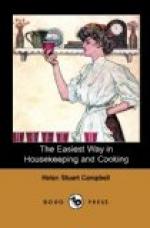Fifth, The intestinal juice; which has some properties like saliva, and is the last product of the digestive forces.
A meal, then, in its passage downward is first diluted and increased in bulk by a watery fluid which prepares all the starchy portion for absorption. Then comes a still more profuse fluid, dissolving all the meaty part. Then the fat is attended to by the stream of pancreatic juice, and at the same time the bile pours upon it, doing its own work in its own mysterious way; and last of all, lest any process should have been imperfect, the long canal sends out a juice having some of the properties of all.
Thus each day’s requirements call for
PINTS.
Of saliva 3-3/4
gastric juice 12
bile 3-3/4
pancreatic juice 1-1/2
intestinal juice 1/2
-------
21-1/2
Do not fancy this is all wasted or lost. Very far from it: for the whole process seems to be a second circulation, as it were; and, while the blood is moving in its wonderful passage through veins and arteries, another circulation as wonderful, an endless current going its unceasing round so long as life lasts, is also taking place. But without food the first would become impossible; and the quality of food, and its proper digestion, mean good or bad blood as the case may be. We must follow our mouthful of food, and see how this action takes place.
When the different juices have all done their work, the chyme, which is food as it passes from the stomach into the duodenum or passage to the lower stomach or bowels, becomes a milky substance called chyle, which moves slowly, pushed by numberless muscles along the bowel, which squeeze much of it into little glands at the back of the bowels. These are called the mesenteric glands; and, as each one receives its portion of chyle, a wonderful thing happens. About half of it is changed into small round bodies called corpuscles, and they float with the rest of the milky fluid through delicate pipes which take it to a sort of bag just in front of the spine. To this bag is fastened another pipe or tube—the thoracic duct—which follows the line of the spine; and up this tube the small bodies travel till they come to the neck and a spot where two veins meet. A door in one opens, and the transformation is complete. The small bodies are raw food no more, but blood, traveling fast to where it may be purified, and begin its endless round in the best condition. For, as you know, venous blood is still impure and dirty blood. Before it can be really alive it must pass through the veins to the right side of the heart, flow through into the upper chamber, then through another door or valve into the lower, where it is pumped out into the lungs. If these lungs are, as they should be, full of pure air, each corpuscle is so charged with




